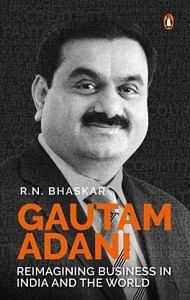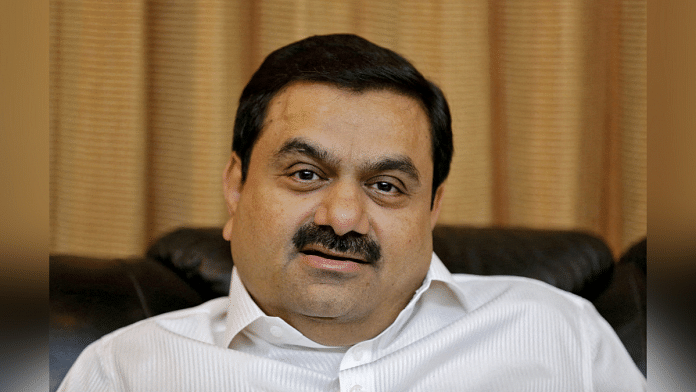Wedding bells Meanwhile, back in Ahmedabad, Sevantilal continued observing intently the zest of this young boy and suggested to his daughter, Priti, that Gautam could be a good match for her. She wasn’t sure because Gautambhai had not finished his graduation, while she herself was pursuing dentistry. But Sevantilal let the idea germinate in his daughter’s mind.
He kept hinting to her that the best man was one who had the intelligence to discover more than one way to stand on his feet, and to make others grow with him. Gently, he persuaded both Gautambhai and Pritiben to meet and to converse with each other. Gradually the doubts melted away, and they got married on 1 May 1986.
Those days were tough on the marriage. Gautambhai’s ambitions took him away from home for several days. His work hours became more intense. Yet, as his wife Pritiben recalls, Gautam had the ability to switch off work once he came home, so that he could have quality time with his family and friends. He continued to do so even after his first child, Karan was born in April 1987.
Also read: Kalam didn’t want to be called ‘power-hungry’. He refused a second term without consensus
Another quality that Gautambhai exhibited in great abundance was the ability to forget a bad transaction. ‘It is done, and over,’ he would tell his colleagues in Gujarati. ‘Let’s proceed to the next item.’
A quality that won him his employees’ respect was to overlook a mistake when it had been done in good faith, and not out of incompetence. Gautam knew that if a trader cannot take losses, he will never be able to grow. The man who made a big mistake and had offered to resign (mentioned earlier in this book) continues to be an important part of Gautam’s operations even today.
Linked to this trait is yet another aspect, which has been talked of earlier in this book. Gautambhai is uncomfortable whenever any party who has done business with him runs into losses on account of some transaction. If the loss related to a transaction with Gautam, and if it were on account of market conditions, Gautambhai would do whatever was possible to give him a better deal next time, so that the earlier losses could be squared off. That, more than any other thing, has allowed him to build a loyal circle of associates around him, who stand by him through thick and thin.
In fact, in order to minimize losses even in trading, Gautam began professionalizing the business with more and more systems put in place. How much of an exposure should a trader be allowed? What are the margins within which he could play independently, beyond which a ratification might be needed? There were many such queries. Thus, while many other export trading houses of those times faded into oblivion, Adani Exports thrived. Part of their success was on account of trading skills, but it was also on account of professionalism that allowed him to scale up and expand the breadth and depth of his operations.
This was to work its way further into systems and processes that Gautam continues to introduce for the entire group even today. ‘His passion for systems is understandable,’ says Devang Desai, former CFO and executive director, Adani Enterprises. ‘If you have to grow big, you need systems in place. What goes to Gautam’s credit is that he has retained the spirit of entrepreneurship, in spite of bringing in systems.’
Ten years ago, Gautambhai worked out of his Ahmedabad office and people could walk into the office with relative ease— though the chairman’s office which was on another floor was kept out of bounds for most people. Today, there is a huge security screening before anyone gets inside Adani Towers at Shantigram, 12 km from Ahmedabad airport. The distance from the city airport, and the security screening for accessing the Adani corporate headquarters have filtered out the needless visit by people to the hub of the Adani empire.
His unquenchable desire to grow is confirmed by some of the most astute merchant bankers like Vallabh Bhanshali of Enam Securities. He says, ‘Gautam has a quiet intensity to grow. He decides where he should be, and then tries to find out the process that will take him there. Another trait is his ability to think big. A quality that defines him is that he is also a family man. He makes time for his family.’
Also read: Technicians in villages to ophthalmologists in cities—Deep-tech startups can help them all
Nimesh Kampani of JM Financial adds one more quality to the list—simplicity. ‘It is his unassuming nature, and his willingness to help others in difficulty, and his commitment to social relationships, that have endeared Gautam to others,’ says Nimesh.
A great deal of credit also goes to the way Pritiben has coped with the situation. She focused solely on bringing up their children. Karan is now thirty-six, with a major in economics from Purdue, USA and is the CEO of APSEZ. Jeet, the younger son, now twenty-nine years old, is VP, group finance for the entire group. He joined the group in 2019, after attending the School of Engineering and Applied Sciences, University of Pennsylvania. And, as Vinodbhai’s wife Ranjanben puts it, ‘Pritiben strengthened the bonds with the other members of our family. Today, the Adani family is united in everything it does. Our family is often cited as an example by our entire community, as a model one should emulate.’
Social bonding creates a resource pool, that in turn ensures that the path to further growth becomes less formidable.
 This excerpt from Gautam Adani: Reimagining Business in India and the World by R.N. Bhaskar has been published with permission from Penguin Random House India.
This excerpt from Gautam Adani: Reimagining Business in India and the World by R.N. Bhaskar has been published with permission from Penguin Random House India.



